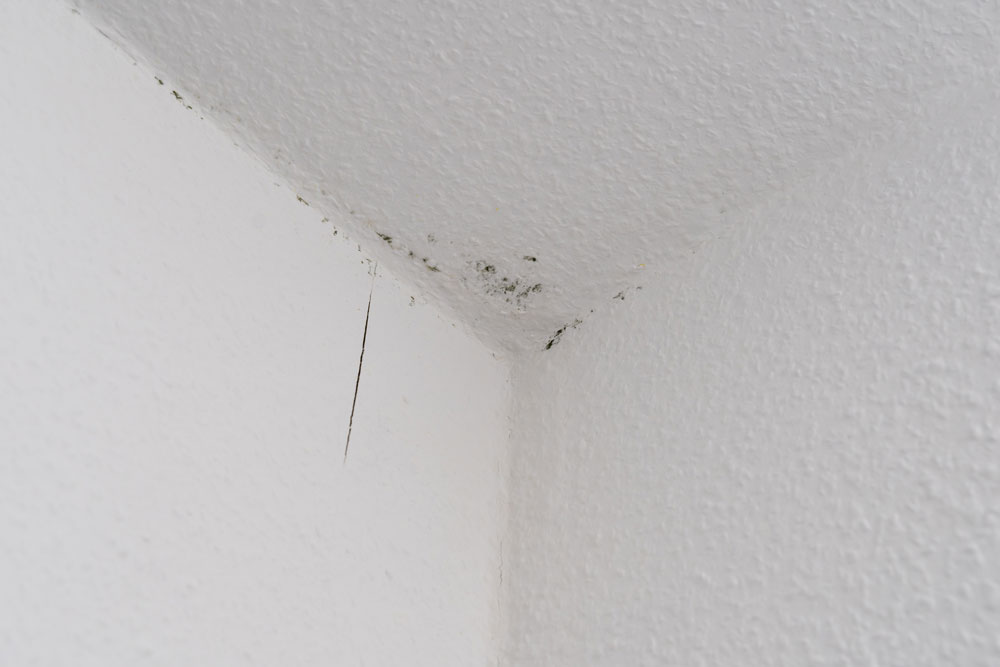Why Do I Get Mould In My Bedroom?
 CONTENTS
CONTENTS
- What causes mould in the bedroom?
- The effects of mould growth in the bedroom
- How to get rid of mould in the bedroom
- How to stop mould in the bedroom
- Frequently asked questions
- Get in touch
We spend around 26 hours of our lives in bed. Keeping our bedrooms free of harmful microorganisms like mould is therefore key to protecting our health.
Here at ICE Cleaning, we offer mould removal services that can eliminate all the mould in your home, including mould in the air, and protect it against the harmful fungus. Our Dewpoint-accredited technicians are available nationwide, 24/7, 365 days a year.
Keep reading to learn what causes mould to grow in the bedroom.
What causes mould in the bedroom?
Mould grows in damp, warm environments with poor ventilation that contain organic material for it to feed off of. Bedrooms often provide mould with its ideal growing conditions.
The primary cause is excess moisture which may stem from external sources like rainwater leaks, rising or penetrating damp, or condensation on windows. The latter is especially a problem in the bedroom. As we sleep, we exhale water vapour, making the air humid. When it comes in contact with a cold surface, like a window, the water vapour condenses, making the window damp.
Drying clothes indoors without adequate ventilation can also make the air humid, encouraging mould growth. Mould growth is particularly common in wardrobes and closets, both of which tend to be stored in or near bedrooms. This can result in mould growth spreading across the room.
The presence of wooden furniture, fabric, and upholstery in the bedroom provides mould with the organic material it needs to grow and thrive, as well.
The effects of mould growth in the bedroom
Mould is not just unsightly - it's harmful, too. Inhaling, ingesting, and touching mould spores can cause a number of health issues, particularly for those with pre-existing respiratory conditions and skin problems, or a weakened immune system.
This includes allergic reactions which usually result in symptoms like sneezing, coughing, and wheezing, asthma attacks, lung infections, and even sick building syndrome.
When it comes to sleep quality, a room infested with mould is far from ideal. Sleep can be disrupted due to the aforementioned health issues triggered by mould exposure. Mould is also strongly linked to insomnia, sleep apnea, snoring, and daytime sleepiness. You can learn more about the effect of mould exposure on sleep here.
Mould can damage your property and possessions, as well. Mould grows by feeding off organic material found in many home items like wood furniture and fabric curtains, leading them to rot over time.
Should it start growing and feeding off building materials, the structural integrity of your home could be compromised, spelling costly repairs down the line.
How to get rid of mould in the bedroom
Mould remediation is not a task you should tackle on your own. Cleaning it brings you in close with the mould, putting you at risk of the health problems it is associated with. Personal protective equipment is required to protect your health during removal.
Many also believe household remedies can fix this issue; however, these are often ineffective and may even exacerbate the issue. Scrubbing the mould, for example, can disperse spores further around your room or even into other parts of your home.
It is recommended you always bring in professional cleaners for mould remediation. Mould cleaners have the specialist equipment and protective gear to safely and thoroughly remove all traces of the mould from the property.
They will even be able to identify the extent of the infestation as well as the cause of it to so you know how to prevent the mould returning in the future. They can address hidden spores that could lead to future outbreaks if left untreated, too.
How to stop mould in the bedroom
Maintain good ventilation
A well-ventilated room lets warm, moist air escape, preventing it from causing condensation. Opening windows regularly or using fans can bring in fresh air and dislodge trapped pockets of stale, humid air.
Keep humidity levels in check
High humidity levels give rise to the damp conditions mould thrives in. Using dehumidifiers and air conditioners can help manage this problem effectively.
Clean regularly and thoroughly
Mould loves dirt and dust as they provide plenty of organic material for it to feed on. Regular cleaning with antibacterial cleaning agents can make sure there is no food available for it.
You can learn more about the different ways to prevent mould growth in the bedroom in this blog.
Frequently asked questions
Is it safe to sleep in a bedroom with mould?
No - mould exposure may lead to allergies or respiratory issues over time, and is closely linked with snoring, obstructive sleep apnea, insomnia, and daytime sleepiness.
Why is there mould in my bedroom that keeps coming back?
Persistent mould suggests an unresolved dampness issue. Seek out hidden leaks or condensation spots which could be fuelling growth.
What causes mould on bedroom walls?
Mould on walls often springs from high humidity, inadequate ventilation, or unseen water damage within wall cavities.
Get in touch
We offer a lifetime guarantee* with every mould removal so if it returns, our technicians will get rid of it again for free.
You can book our technicians for mould remediation by calling our team on 0208 066 0360 or sending an email to enquiries@icecleaning.co.uk.
*subject to advisories

Speak with me today,
I’m here to help
By asking you a few questions either via phone or email I can immediately provide a realistic estimation of the cost.
You’re in good company. We’ve cleaned for the following commercial clients… View all

Why choose us?
- Cater to a wide variety of cleaning situations
- Nationwide coverage, available 24/7
- Cater to commercial and domestic clients
- Free survey provided prior to quotation
- Emergency response team
- Offer a bespoke service designed to suit all your needs
- All technicians hold professional health and safety qualifications, including BICSc, IOSH, Dewpoint Professional & Safe Contractor
We’re fully accredited
We place best practise, professional expertise and health and safety at the core of our business. We’re fully compliant with all legal obligations. You can view a list of our accreditations below, or visit our Health & Safety page for more information.











-RGB-small.1707319151.jpg)




















